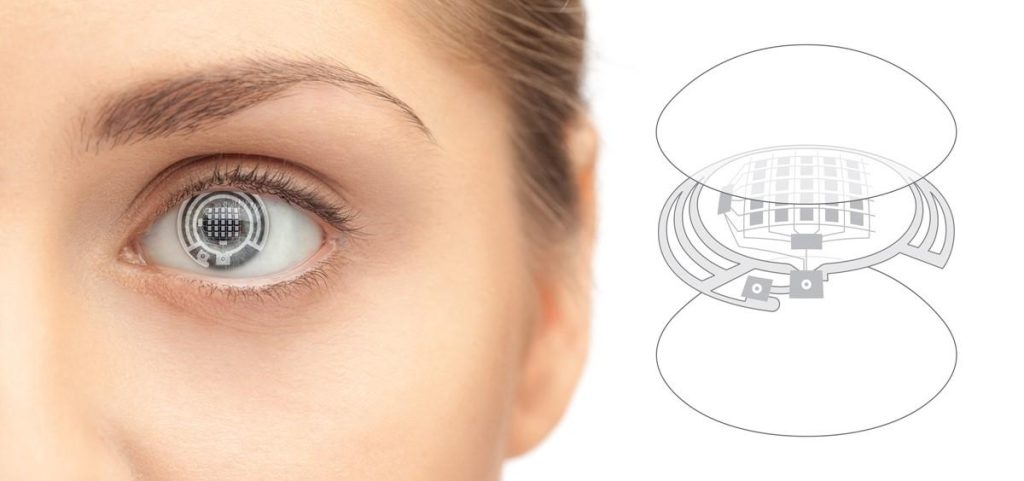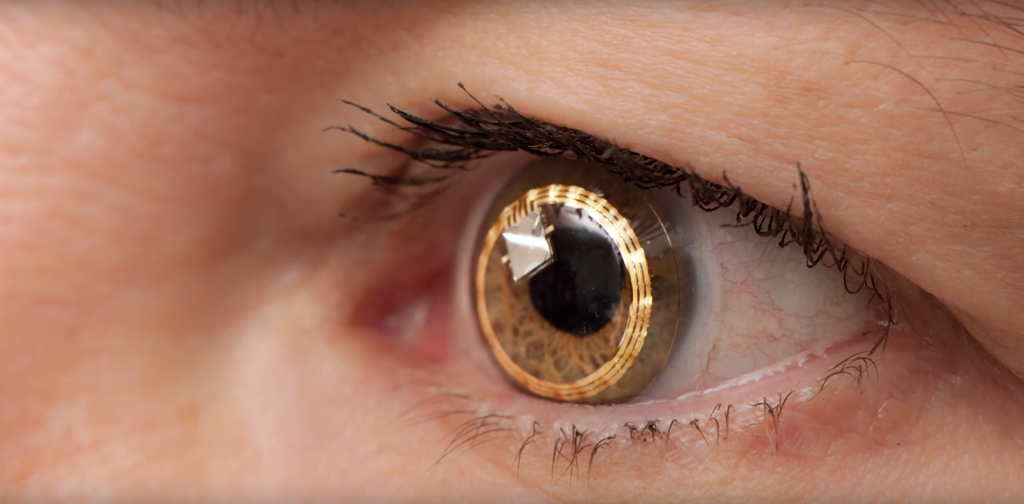What is a Smart Lens? (Trifocal Intraocular Lens) Developing and changing technology also appears in the field of eye health. So, with the latest technological steps, it is possible to eliminate the problems that occur in the eyesight of people.
- How Smart Lenses Work?
- What are the Usage Areas?
- What are the Types of Multifocal Intraocular Lenses?
- Smart Lens Treatments
- How is Smart Lens Surgery Performed?
- What are the Points to Be Considered After the Surgery?
- What are the Risks of Smart Lens Surgery?
- What are the Advantages of Smart Lenses?
- Smart Cataract Surgery
- Trifocal Intraocular Lens Problems
- Trifocal Cataract Lens
- Trifocal Lenses in Turkey
- Smart Lens Surgery Prices in Turkey
The human eye is a magnificently created organ. The cornea layer in the eye has 70% focusing power. The remaining 30% is focused on the eyepiece. While this focusing process continues without any problems until the age of 40-45, after a certain age the eye may lose its focusing function. After this loss, people may experience near-sightedness problems.
As time progresses, the lens of the eye loses its transparency, and cataract formation begins. After cataract formation, the individual can no longer see far as well as near. One of the treatment methods after the formation of this disease is the wearing of smart lenses.
The natural lens of the eye, which is deteriorated by surgery, is removed and replaced with artificial smart lenses. There are three types of these lenses. It is preferred according to the needs of the person and the doctor’s approval, as single-focus, bi-focal, and trifocal.
How Smart Lenses Work?

In their natural creation, the light beam that comes to people’s eyes is refracted and sent to a single focal point on the retina and merges here. After this process, the vision is realized. Our natural eye, which performs this process by stretching on its own, becomes unable to perform this process after a while.
The solution to this is the surgical placement of the smart lenses that will perform this procedure. The working principle of these lenses is also the same. It refracts light and sends it to a single focal point on the retina. This is the answer to the question How Smart Lenses Work.
Trifocal lenses are produced with the aim of refracting light from distances such as near, far, and medium and work with the natural eye principle. These lenses are also produced specially according to one’s own needs. In this way, patients can achieve near-natural vision by using special lenses suitable for their disease.
What are the Usage Areas?
If we answer the question of What are the Usage Areas; Smart lenses produced with the latest technology can generally be applied to individuals with cataracts or individuals who have visual difficulties due to their age. In addition, smart lenses can be a treatment option for patients whose laser treatment is not approved by the doctor.
However, these lenses may not be suitable for everyone. Apart from vision problems and cataracts, a healthy eye is an important criterion for this surgery:
- Individuals with glaucoma
- Individuals with retinal disease
- Individuals with yellow spot disease
- Individuals with optic nerve disease
- Intelligent lens treatment cannot be applied to individuals who have problems in their eyes due to diabetes
What are the Types of Multifocal Intraocular Lenses?
We can explain the answer to the question of Multifocal Intraocular Lens Types as follows:
Smart lenses that provide vision by focusing on a single distance or near vision are called monofocal lenses. After the use of these lenses, there is a need for glasses.
Bifocal lenses, on the other hand, aim at far and near distances. They are called Bifocal Lenses.
Multifocal lenses, also known as trifocal lenses, are called smart lenses. These lenses focus at far, near, and intermediate distances.
Smart Lens Treatments
The process of removing the lens that has lost its transparency and replacing it with smart lenses during cataract surgery is called Smart Lens Treatment. After this surgery, which is performed by specialist doctors in a hospital environment, people do not need glasses or normal lenses.
How is Smart Lens Surgery Performed?

This surgery can be applied to individuals over the age of 40-45 who do not want to wear glasses, even without cataracts. In order to apply this, the person must not be suitable for LASIK laser treatment.
If we go to the answer to the question of How Smart Lens Surgery is Performed; The operation is performed on both eyes on different days. The average operation time is about 10 minutes. During this period, the person’s eye is anesthetized with eye drops containing an anesthetic effect. This numbness prevents the individual from experiencing painful things during the surgery. Contrary to popular belief, general anesthesia is not applied and the person does not need to stay in the hospital after the procedure.
After the surgery, the eye is covered with a bandage and left overnight. The next day, the person starts to see the opening of the bandages. A few days after the first eye surgery, the other eye is operated on and the treatment process ends.
What are the Points to Be Considered After the Surgery?
Smart lens surgeries are a type of surgery that can be completed in a short time and solve the problems of the person if it is performed in expert hands. The issue of What Should Be Considered Post-Surgery, which people are most curious about, is quite confusing. We can list this issue for you as follows:
- First of all, the patient should not forget that he had surgery in a short time and should take good care of his eyes. It should not rub.
- The medicines given by the doctor to the person should be used on time and regularly.
- You should not lie in the prone position for the first 7 days after the operation.
- After the operation, the eye should not come into contact with water for 5 days.
- 2 days after the operation, the person can return to his daily home and work life.
- The control should be done by the doctor the day after the operation.
- The next routine check-ups, on the other hand, should continue after one month and the next ones every 6 months.
What are the Risks of Smart Lens Surgery?

The ease of use of smart lenses, which will be preferred by people who have vision problems in their eyes, is a known thing. However, the question of What Are the Risks of Smart Lens Surgery is one of the questions that people have in mind. We can explain these risks to you as follows.
This surgery does not have serious risks. However, the most important factor in its absence is the expertise and experience of the doctor to be selected. This experience minimizes the risks to be experienced during the surgery. In addition, the smart lens to be selected should be of high quality and the surgical field should be seriously sterilized.
What are the Advantages of Smart Lenses?
If we explain the Advantages of Smart Lenses to you, we can list them as follows:
- Patients do not feel pain with anesthetic drops dripped into the eye during the surgery.
- It is an operation performed in a short period of approximately 10 minutes.
- The patient uses these lenses for life.
- After the operation, there is no improvement in the number of eyes again.
- After the smart lenses are used, the patient does not need glasses or glasses equivalent again.
- After the smart lens surgery, cataracts do not occur in the eyes.
- Ilasik can be applied to eyes that are not in a position to undergo laser treatment.
- After the surgery, serious progress is made in vision.
- After the operation, the patient does not need to stay in the hospital for observation. He is discharged immediately.
Smart Cataract Surgery
Smart cataract surgery is revolutionizing the way ophthalmologists treat this common eye condition. Cataracts, the clouding of the eye’s natural lens, affects millions of people worldwide, leading to blurred vision, difficulty seeing at night, and overall diminished visual acuity. Traditionally, cataract surgery involves manually removing the clouded lens and replacing it with an artificial one. However, with the advent of smart technology, surgeons now have access to advanced tools and techniques that enhance precision and improve patient outcomes.
One of the key features of smart cataract surgery is the use of femtosecond lasers. These lasers allow surgeons to create precise incisions in the eye, enabling a more accurate removal of the clouded lens. By using computer-guided imaging, the lasers can map the eye’s anatomy and tailor the surgery to each patient’s specific needs. This level of customization ensures that the replacement lens is positioned correctly, resulting in improved vision post-surgery.
Another aspect of smart cataract surgery is the integration of artificial intelligence (AI) and machine learning algorithms. These technologies analyze preoperative data, such as the patient’s medical history, imaging scans, and biometric measurements, to provide surgeons with valuable insights and predictions. AI can help identify potential complications, guide surgical decisions, and optimize the surgical plan. By leveraging the power of AI, surgeons can achieve better surgical outcomes and minimize the risk of complications.
Furthermore, smart cataract surgery also includes the use of intraoperative imaging systems. These systems provide real-time feedback during the surgery, allowing surgeons to assess their progress and make any necessary adjustments. Intraoperative imaging enhances surgical accuracy, reduces the risk of errors, and ultimately leads to improved patient satisfaction.
In conclusion, smart cataract surgery is a groundbreaking approach that combines advanced technologies to enhance surgical precision and optimize patient outcomes. By utilizing femtosecond lasers, artificial intelligence, and intraoperative imaging, ophthalmologists can provide patients with safer, more effective cataract surgeries. As this field continues to evolve, the future of cataract surgery looks promising, offering patients improved vision and a better quality of life.
Trifocal Intraocular Lens Problems

Trifocal intraocular lens (IOL) problems have become a topic of concern in the field of ophthalmology. These specialized lenses, designed to provide patients with clear vision at near, intermediate, and far distances, have gained popularity due to their potential to eliminate the need for glasses after cataract surgery or refractive lens exchange. However, despite their promising benefits, trifocal IOLs are not without their challenges.
One of the main problems associated with trifocal IOLs is the occurrence of visual disturbances, such as glare, halos, and starbursts. These phenomena can significantly impact a patient’s quality of life, especially when driving at night or in low-light conditions. Additionally, some individuals may experience difficulties with contrast sensitivity, leading to reduced visual acuity in certain situations.
Another issue that may arise with trifocal IOLs is the potential for decreased visual performance at intermediate distances. While these lenses are designed to provide clear vision at all three distances, some patients may find that their visual acuity is compromised in tasks such as reading a computer screen or using a smartphone. This can be particularly frustrating for individuals who rely heavily on these devices for work or leisure activities.
Moreover, the selection of the appropriate power and design of trifocal IOLs can be challenging. Factors such as corneal astigmatism, pupil size, and patient expectations need to be carefully considered to achieve optimal visual outcomes. Failure to accurately predict these variables may result in suboptimal vision or the need for additional corrective procedures.
In conclusion, while trifocal intraocular lenses offer a potential solution for achieving clear vision at multiple distances, they are not without their drawbacks. Visual disturbances, decreased performance at intermediate distances, and the complexity of lens selection are among the problems that patients and ophthalmologists may encounter. Continued research and advancements in technology are essential to address these challenges and improve the outcomes for individuals seeking to reduce their dependence on glasses.
Trifocal Cataract Lens
As we age, our eyesight tends to deteriorate, and one common condition that affects millions of people worldwide is cataracts. Cataracts cause a clouding of the lens inside the eye, leading to blurry vision and difficulty seeing clearly. However, thanks to advancements in medical technology, a revolutionary solution has emerged – the trifocal cataract lens.
The trifocal cataract lens is a groundbreaking innovation that aims to restore clear vision for individuals suffering from cataracts. Unlike traditional mono-focal lenses, which only correct vision at one distance, trifocal lenses provide clear vision at near, intermediate, and far distances. This remarkable feature allows individuals to regain their ability to see objects up close, such as when reading a book or using a smartphone, as well as objects at a distance, like road signs or television screens.
The key to the trifocal cataract lens lies in its unique design. It incorporates multiple focal points, enabling light to be focused simultaneously at different distances. This means that the brain can seamlessly adjust and process visual information from various distances, resulting in improved overall vision. With trifocal lenses, individuals can experience enhanced depth perception and reduced dependence on glasses or contact lenses for activities like reading, driving, or engaging in hobbies.
Furthermore, the trifocal cataract lens offers a high level of patient satisfaction. Clinical studies have shown that individuals who opt for trifocal lenses report a significant improvement in their quality of life and overall visual experience. The ability to see clearly at various distances can enhance independence, confidence, and overall well-being.
In conclusion, the trifocal cataract lens represents a remarkable advancement in the field of ophthalmology. By providing clear vision at near, intermediate, and far distances, it offers a revolutionary solution for individuals suffering from cataracts. With its unique design and proven patient satisfaction, the trifocal cataract lens is changing lives and enabling people to enjoy the world around them with newfound clarity and freedom.
Trifocal Lenses in Turkey
In the ever-evolving field of ophthalmology, Turkey has emerged as a leading destination for individuals seeking advanced eye care solutions. Among the many groundbreaking innovations, trifocal lenses have gained significant popularity due to their ability to provide clear vision at multiple distances. Trifocal lenses are a type of multifocal lens that offers a seamless transition between near, intermediate, and far vision, making them an ideal choice for individuals suffering from presbyopia or age-related farsightedness.
Turkey’s reputation as a hub for medical tourism is well-deserved, with its world-class healthcare facilities and highly skilled ophthalmologists. Patients from around the globe flock to this transcontinental country to benefit from its cutting-edge technologies and expertise in eye care. Trifocal lenses, in particular, have become a sought-after solution for those seeking to reduce their dependence on glasses or contact lenses.
What sets trifocal lenses apart is their ability to provide clear vision at all distances, eliminating the need for multiple pairs of glasses or constant adjustments. By incorporating three different focal points into a single lens, trifocal lenses allow wearers to seamlessly shift their focus between near, intermediate, and far distances. This revolutionary technology not only enhances visual acuity but also improves overall quality of life, enabling individuals to engage in daily activities with ease.
Turkey’s commitment to advancing ophthalmic care has led to the availability of a wide range of trifocal lenses, catering to the unique needs of each patient. Whether it’s a monofocal, bifocal, or trifocal lens, Turkish eye care centers offer personalized solutions to address specific visual impairments. Moreover, the affordability of these lenses, combined with the exceptional quality of care, makes Turkey an attractive destination for individuals seeking multifocal lens options.
In conclusion, trifocal lenses in Turkey have revolutionized the field of vision correction, providing individuals with a clear and seamless visual experience. With its world-class healthcare facilities and skilled ophthalmologists, Turkey has become a leading destination for those seeking advanced eye care solutions. By opting for trifocal lenses, patients can bid farewell to the inconvenience of multiple glasses and embrace a clearer future.
Smart Lens Surgery Prices in Turkey
Turkey, which closely follows the developing and advancing science and technology, has also made significant progress in Smart Lens Therapy. Many foreign people prefer Turkey to have this surgery. We can list the reasons for these preferences for you as follows:
- All treatments in Turkey are intertwined with science and are carried out with the help of the latest technology
- Hospitals are spacious and comfortable
- Fully equipped hospitals
- The fact that doctors and nurses are experienced in their field
- All staff, including the intermediary company staff who take care of the patients, are friendly and helpful
- Having the opportunity to have a holiday in Turkey after the treatment
- Factors such as Smart Lens Surgery Prices in Turkey, food and beverage prices, and affordable prices for essential needs such as accommodation prices can be shown among the reasons for this preference
If you also want to have smart lens surgery in Turkey through us, we can facilitate your visa procedures with the invitation letter we send to your consulate. You can also contact us for all questions and detailed price information.

Vimfay International Health Services